Factors Affecting Health Disparities among Indigenous Australians
VerifiedAdded on 2022/08/18
|6
|1281
|13
Report
AI Summary
This report investigates the factors contributing to health disparities among Aboriginal and Torres Strait Islander communities in Australia. It explores the impact of globalization, highlighting how increased risks from tobacco, alcohol, and infectious diseases, along with financial burdens and inadequate healthcare facilities, negatively affect this population. The report delves into social factors such as lack of interaction, support, and equal rights, as well as political factors like inequitable fund distribution and policies, which exacerbate health issues. The analysis includes statistical data on income, nutrition, and child removal rates, concluding that low-quality treatment and unequal access to resources increase mortality risks. The report emphasizes the need to address these multifaceted challenges to improve the health outcomes for Indigenous Australians.

RUNNING HEAD: HEALTHCARE 0
INDIGINEOUS HEALTH
INDIGINEOUS HEALTH
Paraphrase This Document
Need a fresh take? Get an instant paraphrase of this document with our AI Paraphraser
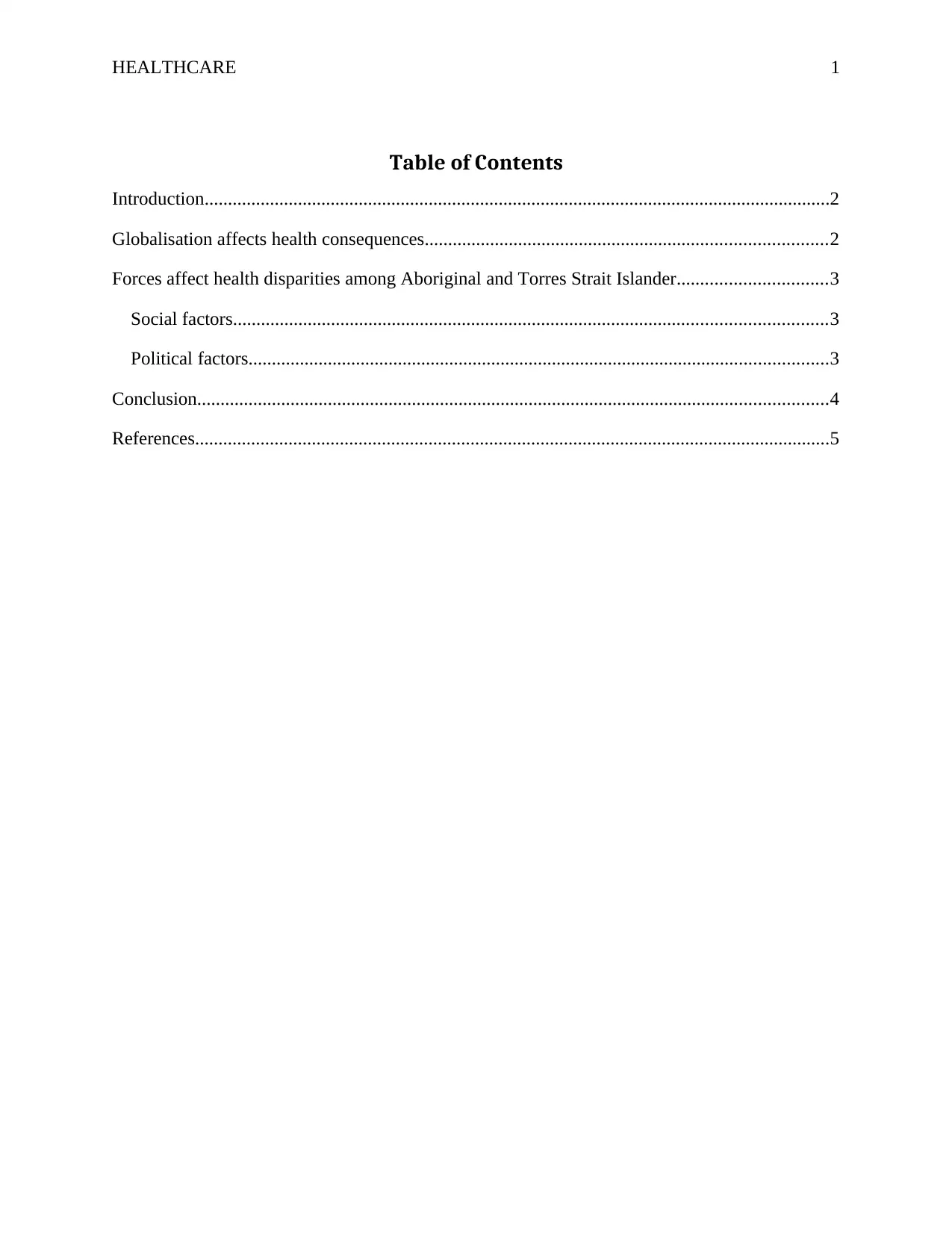
HEALTHCARE 1
Table of Contents
Introduction......................................................................................................................................2
Globalisation affects health consequences......................................................................................2
Forces affect health disparities among Aboriginal and Torres Strait Islander................................3
Social factors...............................................................................................................................3
Political factors............................................................................................................................3
Conclusion.......................................................................................................................................4
References........................................................................................................................................5
Table of Contents
Introduction......................................................................................................................................2
Globalisation affects health consequences......................................................................................2
Forces affect health disparities among Aboriginal and Torres Strait Islander................................3
Social factors...............................................................................................................................3
Political factors............................................................................................................................3
Conclusion.......................................................................................................................................4
References........................................................................................................................................5
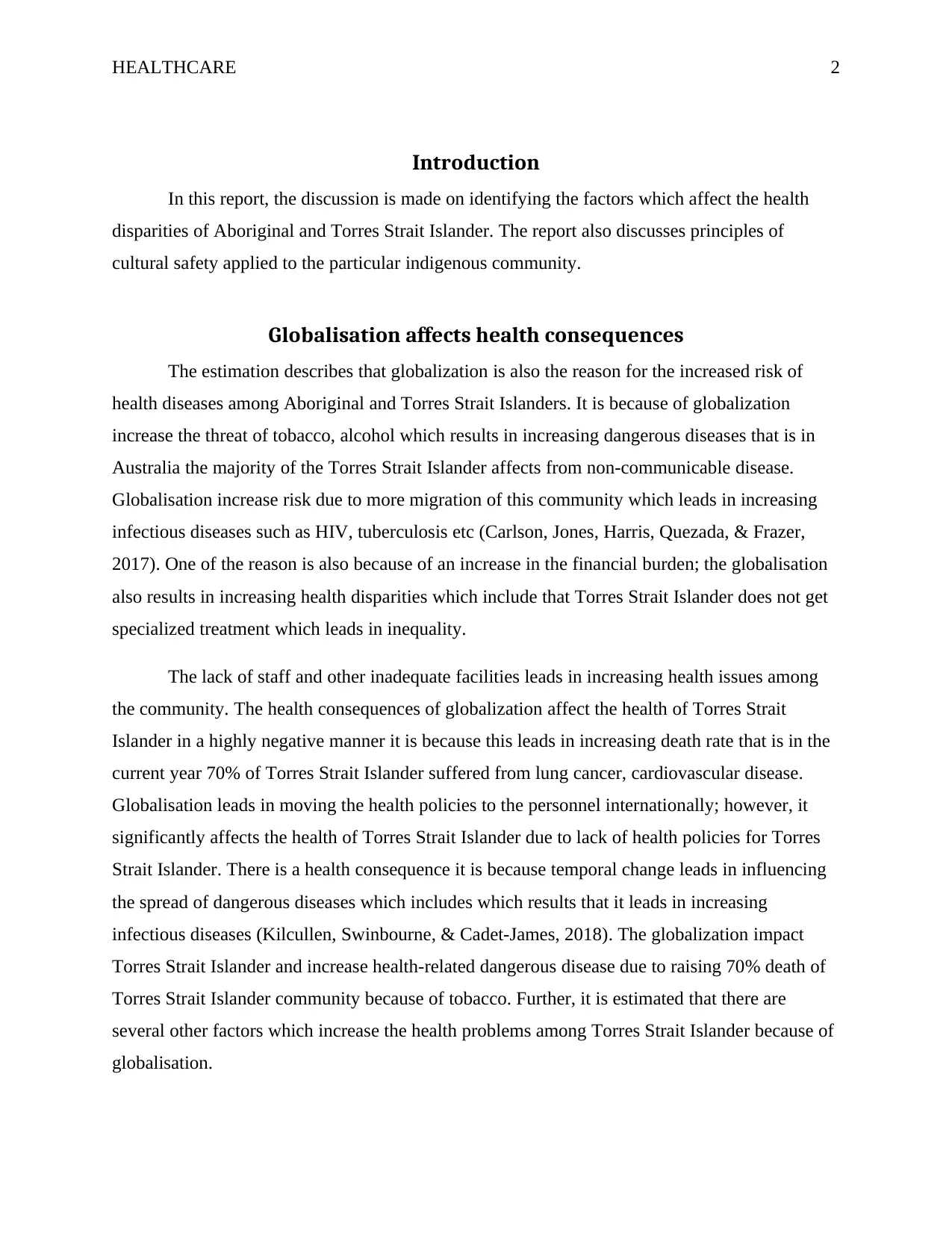
HEALTHCARE 2
Introduction
In this report, the discussion is made on identifying the factors which affect the health
disparities of Aboriginal and Torres Strait Islander. The report also discusses principles of
cultural safety applied to the particular indigenous community.
Globalisation affects health consequences
The estimation describes that globalization is also the reason for the increased risk of
health diseases among Aboriginal and Torres Strait Islanders. It is because of globalization
increase the threat of tobacco, alcohol which results in increasing dangerous diseases that is in
Australia the majority of the Torres Strait Islander affects from non-communicable disease.
Globalisation increase risk due to more migration of this community which leads in increasing
infectious diseases such as HIV, tuberculosis etc (Carlson, Jones, Harris, Quezada, & Frazer,
2017). One of the reason is also because of an increase in the financial burden; the globalisation
also results in increasing health disparities which include that Torres Strait Islander does not get
specialized treatment which leads in inequality.
The lack of staff and other inadequate facilities leads in increasing health issues among
the community. The health consequences of globalization affect the health of Torres Strait
Islander in a highly negative manner it is because this leads in increasing death rate that is in the
current year 70% of Torres Strait Islander suffered from lung cancer, cardiovascular disease.
Globalisation leads in moving the health policies to the personnel internationally; however, it
significantly affects the health of Torres Strait Islander due to lack of health policies for Torres
Strait Islander. There is a health consequence it is because temporal change leads in influencing
the spread of dangerous diseases which includes which results that it leads in increasing
infectious diseases (Kilcullen, Swinbourne, & Cadet‐James, 2018). The globalization impact
Torres Strait Islander and increase health-related dangerous disease due to raising 70% death of
Torres Strait Islander community because of tobacco. Further, it is estimated that there are
several other factors which increase the health problems among Torres Strait Islander because of
globalisation.
Introduction
In this report, the discussion is made on identifying the factors which affect the health
disparities of Aboriginal and Torres Strait Islander. The report also discusses principles of
cultural safety applied to the particular indigenous community.
Globalisation affects health consequences
The estimation describes that globalization is also the reason for the increased risk of
health diseases among Aboriginal and Torres Strait Islanders. It is because of globalization
increase the threat of tobacco, alcohol which results in increasing dangerous diseases that is in
Australia the majority of the Torres Strait Islander affects from non-communicable disease.
Globalisation increase risk due to more migration of this community which leads in increasing
infectious diseases such as HIV, tuberculosis etc (Carlson, Jones, Harris, Quezada, & Frazer,
2017). One of the reason is also because of an increase in the financial burden; the globalisation
also results in increasing health disparities which include that Torres Strait Islander does not get
specialized treatment which leads in inequality.
The lack of staff and other inadequate facilities leads in increasing health issues among
the community. The health consequences of globalization affect the health of Torres Strait
Islander in a highly negative manner it is because this leads in increasing death rate that is in the
current year 70% of Torres Strait Islander suffered from lung cancer, cardiovascular disease.
Globalisation leads in moving the health policies to the personnel internationally; however, it
significantly affects the health of Torres Strait Islander due to lack of health policies for Torres
Strait Islander. There is a health consequence it is because temporal change leads in influencing
the spread of dangerous diseases which includes which results that it leads in increasing
infectious diseases (Kilcullen, Swinbourne, & Cadet‐James, 2018). The globalization impact
Torres Strait Islander and increase health-related dangerous disease due to raising 70% death of
Torres Strait Islander community because of tobacco. Further, it is estimated that there are
several other factors which increase the health problems among Torres Strait Islander because of
globalisation.
⊘ This is a preview!⊘
Do you want full access?
Subscribe today to unlock all pages.

Trusted by 1+ million students worldwide
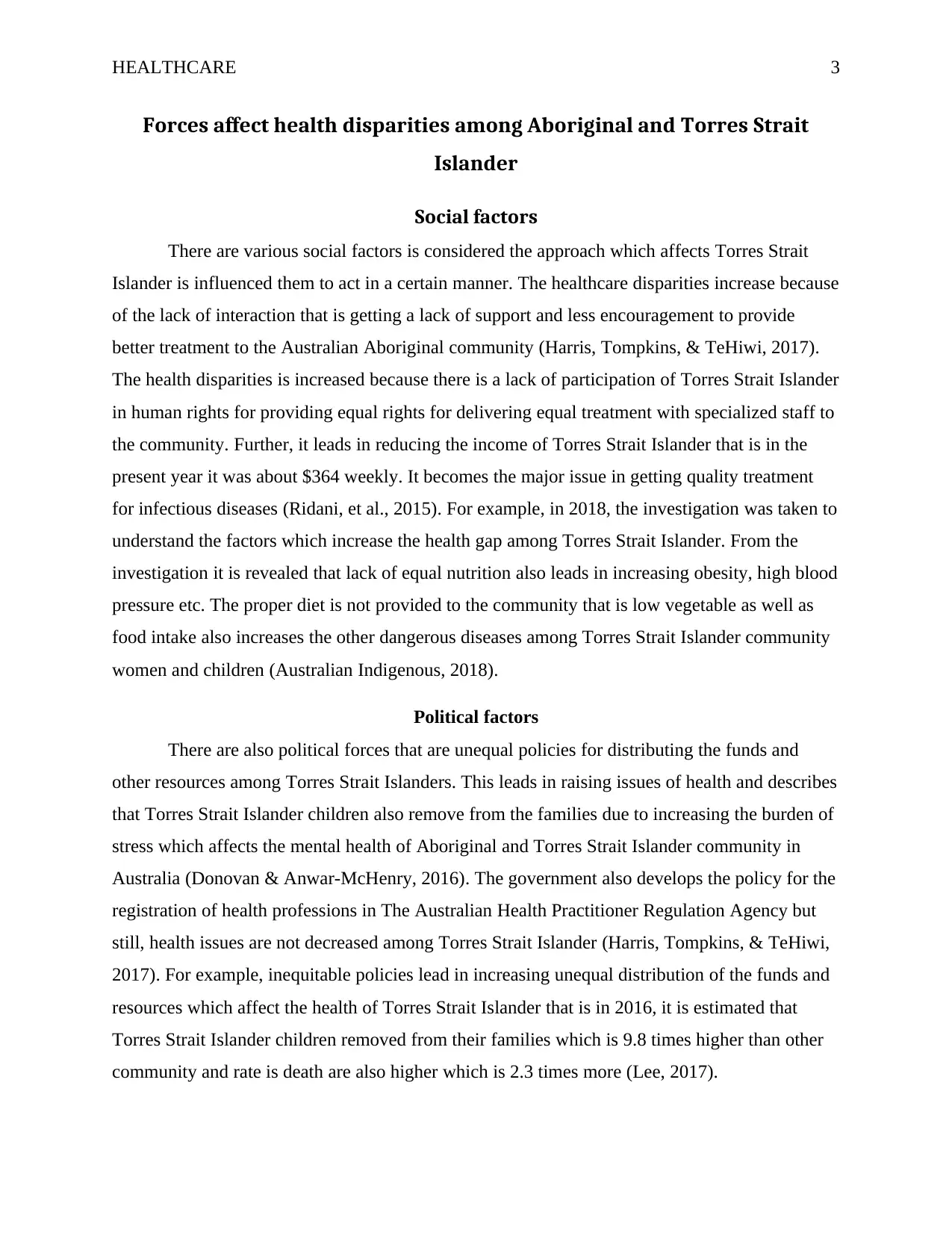
HEALTHCARE 3
Forces affect health disparities among Aboriginal and Torres Strait
Islander
Social factors
There are various social factors is considered the approach which affects Torres Strait
Islander is influenced them to act in a certain manner. The healthcare disparities increase because
of the lack of interaction that is getting a lack of support and less encouragement to provide
better treatment to the Australian Aboriginal community (Harris, Tompkins, & TeHiwi, 2017).
The health disparities is increased because there is a lack of participation of Torres Strait Islander
in human rights for providing equal rights for delivering equal treatment with specialized staff to
the community. Further, it leads in reducing the income of Torres Strait Islander that is in the
present year it was about $364 weekly. It becomes the major issue in getting quality treatment
for infectious diseases (Ridani, et al., 2015). For example, in 2018, the investigation was taken to
understand the factors which increase the health gap among Torres Strait Islander. From the
investigation it is revealed that lack of equal nutrition also leads in increasing obesity, high blood
pressure etc. The proper diet is not provided to the community that is low vegetable as well as
food intake also increases the other dangerous diseases among Torres Strait Islander community
women and children (Australian Indigenous, 2018).
Political factors
There are also political forces that are unequal policies for distributing the funds and
other resources among Torres Strait Islanders. This leads in raising issues of health and describes
that Torres Strait Islander children also remove from the families due to increasing the burden of
stress which affects the mental health of Aboriginal and Torres Strait Islander community in
Australia (Donovan & Anwar-McHenry, 2016). The government also develops the policy for the
registration of health professions in The Australian Health Practitioner Regulation Agency but
still, health issues are not decreased among Torres Strait Islander (Harris, Tompkins, & TeHiwi,
2017). For example, inequitable policies lead in increasing unequal distribution of the funds and
resources which affect the health of Torres Strait Islander that is in 2016, it is estimated that
Torres Strait Islander children removed from their families which is 9.8 times higher than other
community and rate is death are also higher which is 2.3 times more (Lee, 2017).
Forces affect health disparities among Aboriginal and Torres Strait
Islander
Social factors
There are various social factors is considered the approach which affects Torres Strait
Islander is influenced them to act in a certain manner. The healthcare disparities increase because
of the lack of interaction that is getting a lack of support and less encouragement to provide
better treatment to the Australian Aboriginal community (Harris, Tompkins, & TeHiwi, 2017).
The health disparities is increased because there is a lack of participation of Torres Strait Islander
in human rights for providing equal rights for delivering equal treatment with specialized staff to
the community. Further, it leads in reducing the income of Torres Strait Islander that is in the
present year it was about $364 weekly. It becomes the major issue in getting quality treatment
for infectious diseases (Ridani, et al., 2015). For example, in 2018, the investigation was taken to
understand the factors which increase the health gap among Torres Strait Islander. From the
investigation it is revealed that lack of equal nutrition also leads in increasing obesity, high blood
pressure etc. The proper diet is not provided to the community that is low vegetable as well as
food intake also increases the other dangerous diseases among Torres Strait Islander community
women and children (Australian Indigenous, 2018).
Political factors
There are also political forces that are unequal policies for distributing the funds and
other resources among Torres Strait Islanders. This leads in raising issues of health and describes
that Torres Strait Islander children also remove from the families due to increasing the burden of
stress which affects the mental health of Aboriginal and Torres Strait Islander community in
Australia (Donovan & Anwar-McHenry, 2016). The government also develops the policy for the
registration of health professions in The Australian Health Practitioner Regulation Agency but
still, health issues are not decreased among Torres Strait Islander (Harris, Tompkins, & TeHiwi,
2017). For example, inequitable policies lead in increasing unequal distribution of the funds and
resources which affect the health of Torres Strait Islander that is in 2016, it is estimated that
Torres Strait Islander children removed from their families which is 9.8 times higher than other
community and rate is death are also higher which is 2.3 times more (Lee, 2017).
Paraphrase This Document
Need a fresh take? Get an instant paraphrase of this document with our AI Paraphraser
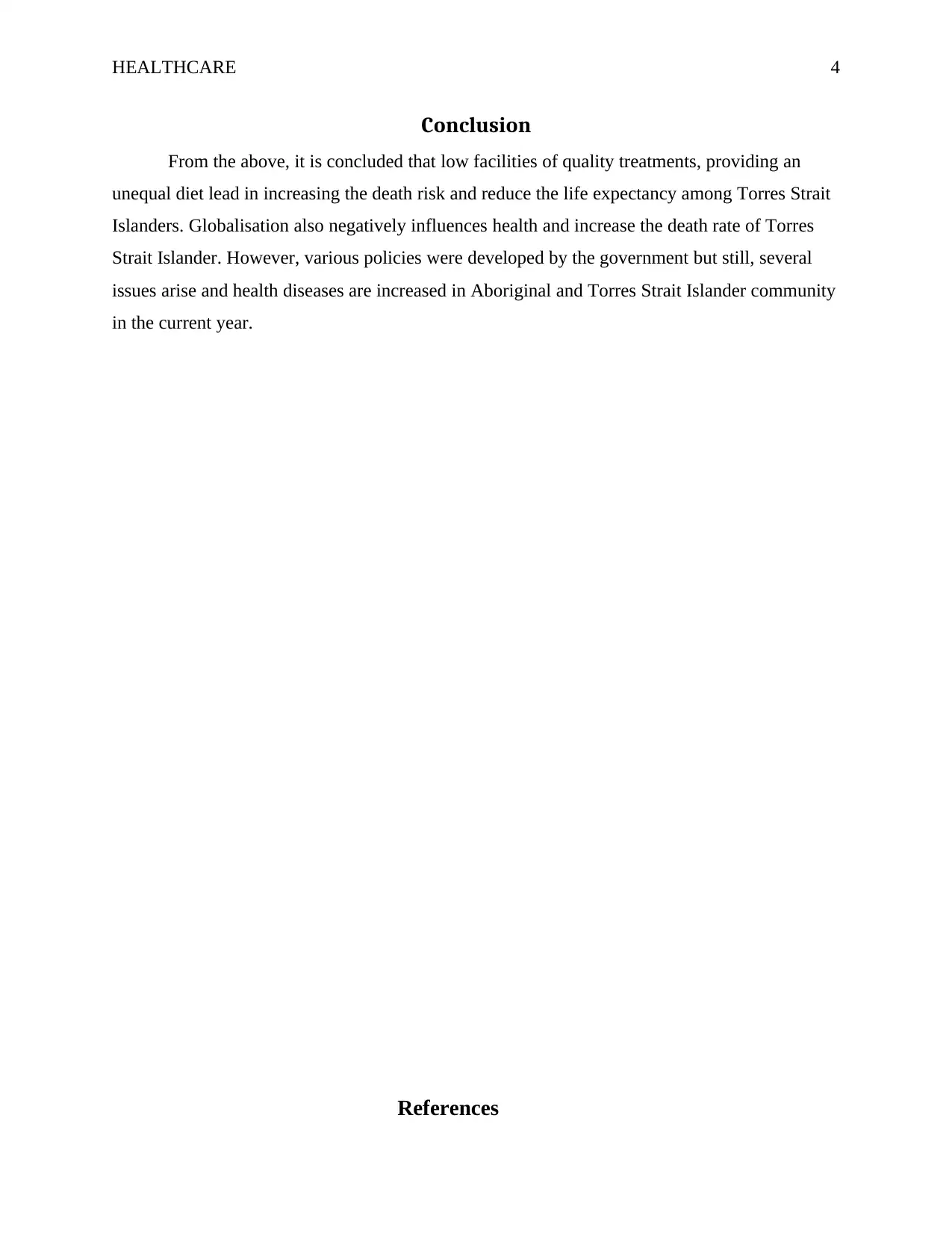
HEALTHCARE 4
Conclusion
From the above, it is concluded that low facilities of quality treatments, providing an
unequal diet lead in increasing the death risk and reduce the life expectancy among Torres Strait
Islanders. Globalisation also negatively influences health and increase the death rate of Torres
Strait Islander. However, various policies were developed by the government but still, several
issues arise and health diseases are increased in Aboriginal and Torres Strait Islander community
in the current year.
References
Conclusion
From the above, it is concluded that low facilities of quality treatments, providing an
unequal diet lead in increasing the death risk and reduce the life expectancy among Torres Strait
Islanders. Globalisation also negatively influences health and increase the death rate of Torres
Strait Islander. However, various policies were developed by the government but still, several
issues arise and health diseases are increased in Aboriginal and Torres Strait Islander community
in the current year.
References
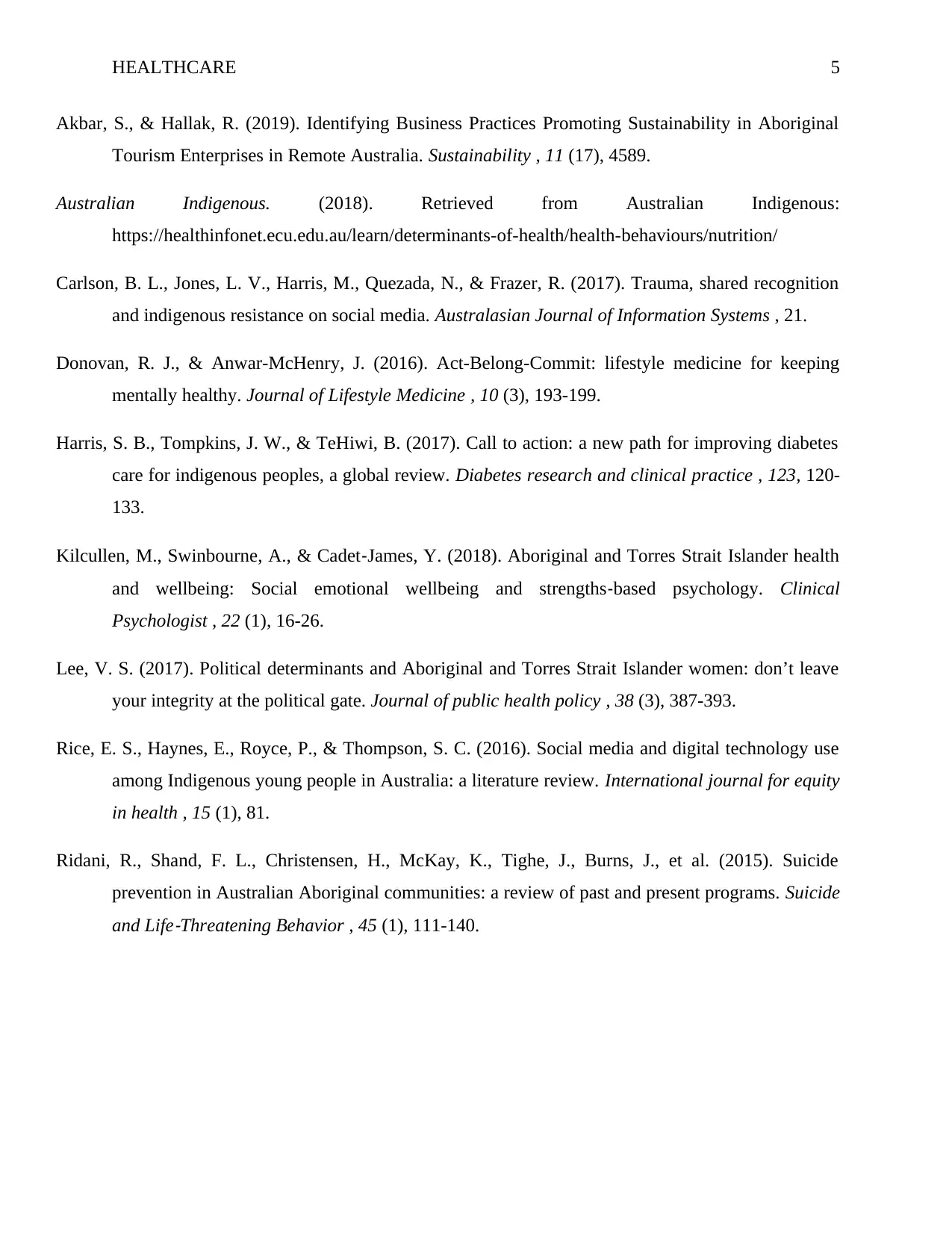
HEALTHCARE 5
Akbar, S., & Hallak, R. (2019). Identifying Business Practices Promoting Sustainability in Aboriginal
Tourism Enterprises in Remote Australia. Sustainability , 11 (17), 4589.
Australian Indigenous. (2018). Retrieved from Australian Indigenous:
https://healthinfonet.ecu.edu.au/learn/determinants-of-health/health-behaviours/nutrition/
Carlson, B. L., Jones, L. V., Harris, M., Quezada, N., & Frazer, R. (2017). Trauma, shared recognition
and indigenous resistance on social media. Australasian Journal of Information Systems , 21.
Donovan, R. J., & Anwar-McHenry, J. (2016). Act-Belong-Commit: lifestyle medicine for keeping
mentally healthy. Journal of Lifestyle Medicine , 10 (3), 193-199.
Harris, S. B., Tompkins, J. W., & TeHiwi, B. (2017). Call to action: a new path for improving diabetes
care for indigenous peoples, a global review. Diabetes research and clinical practice , 123, 120-
133.
Kilcullen, M., Swinbourne, A., & Cadet‐James, Y. (2018). Aboriginal and Torres Strait Islander health
and wellbeing: Social emotional wellbeing and strengths‐based psychology. Clinical
Psychologist , 22 (1), 16-26.
Lee, V. S. (2017). Political determinants and Aboriginal and Torres Strait Islander women: don’t leave
your integrity at the political gate. Journal of public health policy , 38 (3), 387-393.
Rice, E. S., Haynes, E., Royce, P., & Thompson, S. C. (2016). Social media and digital technology use
among Indigenous young people in Australia: a literature review. International journal for equity
in health , 15 (1), 81.
Ridani, R., Shand, F. L., Christensen, H., McKay, K., Tighe, J., Burns, J., et al. (2015). Suicide
prevention in Australian Aboriginal communities: a review of past and present programs. Suicide
and Life
‐Threatening Behavior , 45 (1), 111-140.
Akbar, S., & Hallak, R. (2019). Identifying Business Practices Promoting Sustainability in Aboriginal
Tourism Enterprises in Remote Australia. Sustainability , 11 (17), 4589.
Australian Indigenous. (2018). Retrieved from Australian Indigenous:
https://healthinfonet.ecu.edu.au/learn/determinants-of-health/health-behaviours/nutrition/
Carlson, B. L., Jones, L. V., Harris, M., Quezada, N., & Frazer, R. (2017). Trauma, shared recognition
and indigenous resistance on social media. Australasian Journal of Information Systems , 21.
Donovan, R. J., & Anwar-McHenry, J. (2016). Act-Belong-Commit: lifestyle medicine for keeping
mentally healthy. Journal of Lifestyle Medicine , 10 (3), 193-199.
Harris, S. B., Tompkins, J. W., & TeHiwi, B. (2017). Call to action: a new path for improving diabetes
care for indigenous peoples, a global review. Diabetes research and clinical practice , 123, 120-
133.
Kilcullen, M., Swinbourne, A., & Cadet‐James, Y. (2018). Aboriginal and Torres Strait Islander health
and wellbeing: Social emotional wellbeing and strengths‐based psychology. Clinical
Psychologist , 22 (1), 16-26.
Lee, V. S. (2017). Political determinants and Aboriginal and Torres Strait Islander women: don’t leave
your integrity at the political gate. Journal of public health policy , 38 (3), 387-393.
Rice, E. S., Haynes, E., Royce, P., & Thompson, S. C. (2016). Social media and digital technology use
among Indigenous young people in Australia: a literature review. International journal for equity
in health , 15 (1), 81.
Ridani, R., Shand, F. L., Christensen, H., McKay, K., Tighe, J., Burns, J., et al. (2015). Suicide
prevention in Australian Aboriginal communities: a review of past and present programs. Suicide
and Life
‐Threatening Behavior , 45 (1), 111-140.
⊘ This is a preview!⊘
Do you want full access?
Subscribe today to unlock all pages.

Trusted by 1+ million students worldwide
1 out of 6
Related Documents
Your All-in-One AI-Powered Toolkit for Academic Success.
+13062052269
info@desklib.com
Available 24*7 on WhatsApp / Email
![[object Object]](/_next/static/media/star-bottom.7253800d.svg)
Unlock your academic potential
Copyright © 2020–2026 A2Z Services. All Rights Reserved. Developed and managed by ZUCOL.





